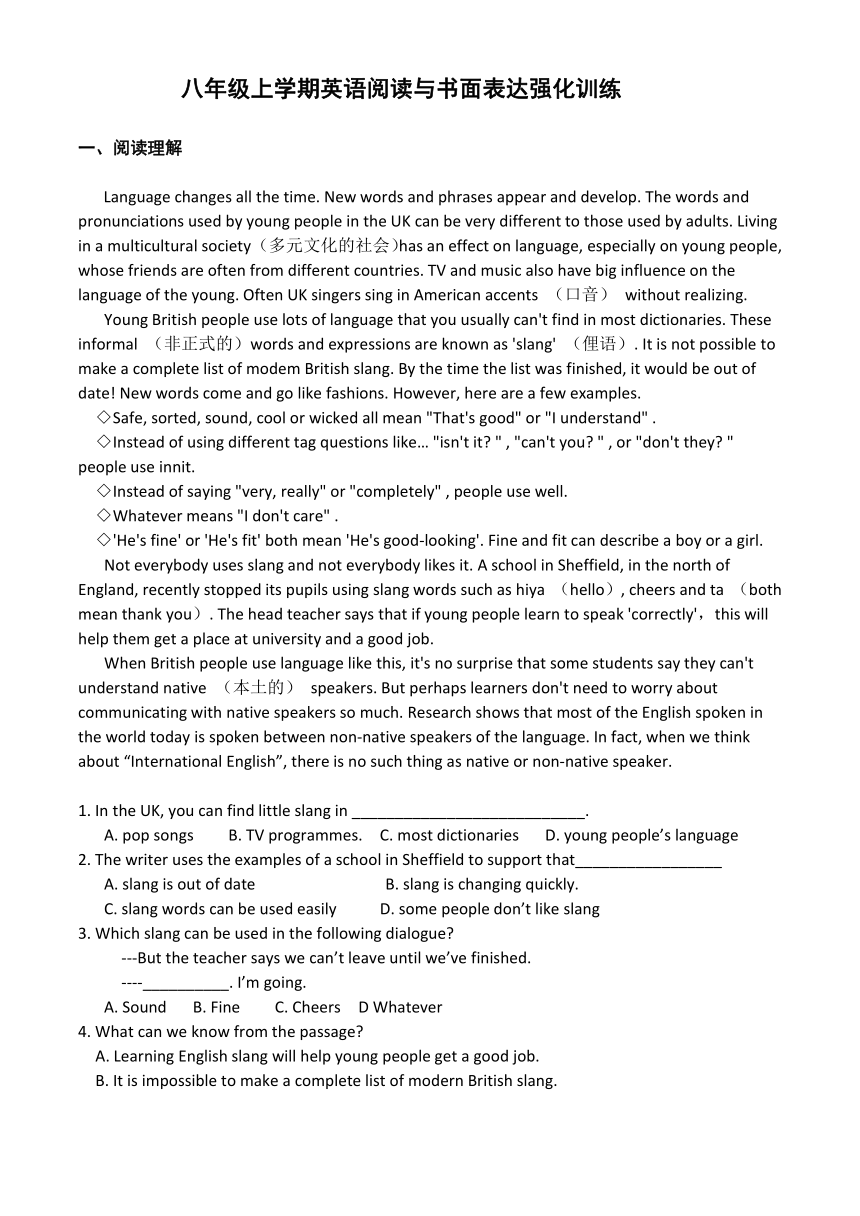
八年级上学期英语阅读与书面表达强化训练 一、阅读理解 Language changes all the time. New words and phrases appear and develop. The words and pronunciations used by young people in the UK can be very different to those used by adults. Living in a multicultural society (多元文化的社会)has an effect on language, especially on young people, whose friends are often from different countries. TV and music also have big influence on the language of the young. Often UK singers sing in American accents (口音) without realizing. Young British people use lots of language that you usually can't find in most dictionaries. These informal (非正式的)words and expressions are known as 'slang' (俚语). It is not possible to make a complete list of modem British slang. By the time the list was finished, it would be out of date! New words come and go like fashions. However, here are a few examples. ◇Safe, sorted, sound, cool or wicked all mean "That's good" or "I understand" . ◇Instead of using different tag questions like… "isn't it " , "can't you " , or "don't they " people use innit. ◇Instead of saying "very, really" or "completely" , people use well. ◇Whatever means "I don't care" . ◇'He's fine' or 'He's fit' both mean 'He's good-looking'. Fine and fit can describe a boy or a girl. Not everybody uses slang and not everybody likes it. A school in Sheffield, in the north of England, recently stopped its pupils using slang words such as hiya (hello), cheers and ta (both mean thank you). The head teacher says that if young people learn to speak 'correctly',this will help them get a place at university and a good job. When British people use language like this, it's no surprise that some students say they can't understand native (本土的) speakers. But perhaps learners don't need to worry about communicating with native speakers so much. Research shows that most of the English spoken in the world today is spoken between non-native speakers of the language. In fact, when we think about “International English”, there is no such thing as native or non-native speaker. 1. In the UK, you can find little slang in _____. A. pop songs B. TV programmes. C. most dictionaries D. young people’s language 2. The writer uses the examples of a school in Sheffield to support that_____ A. slang is out of date B. slang is changing quickly. C. slang words can be used easily D. some people don’t like slang 3. Which slang can be used in the following dialogue --But the teacher says we can’t leave until we’ve finished. --_____. I’m going. A. Sound B. Fine C. Cheers D Whatever 4. What can we know from the passage A. Learning English slang will help young people get a good job. B. It is impossible to make a complete list of modern British slang. C. Young British people speak slang less than adults. D. There is too much slang when learners communicate with non-native speakers. 二、短文填空. 根据下面短文内容,在短文的空格处填上一个恰当的词,使短文完整、通顺. A I had a dr ... ...
~~ 您好,已阅读到文档的结尾了 ~~

